BBC News live coverage moves to a new pagepublished at 00:29 GMT 1 November 2023
Because of a technical reason, our live coverage is moving to a new page.
Click here to continue following the latest updates and analysis.
Israel's military has confirmed that its jets carried out an attack on the Jabalia refugee camp in Gaza
The IDF says the strike killed a senior Hamas commander and caused the collapse of Hamas's underground infrastructure
The Hamas-run health ministry and a hospital director say at least 50 people were killed; pictures from the scene show craters and levelled buildings
The camp is in northern Gaza - an area where Israel has told people to leave for their safety
On Tuesday morning, Israel said it hit 300 targets in Gaza overnight as its air strikes and ground offensive continue
The IDF says its ground forces were attacked by "terrorists" with anti-tank missiles and machine gun fire
Israel has been bombing Gaza since the 7 October Hamas attacks that killed 1,400 people and saw at least 239 people kidnapped as hostages
The Hamas-run health ministry in Gaza says more than 8,500 people have been killed since Israel's retaliatory bombing began
Edited by Brandon Livesay
Because of a technical reason, our live coverage is moving to a new page.
Click here to continue following the latest updates and analysis.
 Paul Adams
Paul Adams
Reporting from Jerusalem
IDF spokesman Lt Col Jonathan Conricus has been giving more details on today’s strike on Jabalia in the Gaza Strip.
He said the target, Ibrahim Biari, was a senior and important Hamas battalion commander. Conricus described him as “pivotal in the planning and execution of the Oct 7 attacks".
Conricus said “multiple dozens” of Hamas fighters had been killed in a “vast underground tunnel complex” from where Biari was directing operations.
He said the IDF had struck in-between buildings, targeting the tunnel complex underneath. The collapse of the tunnels, he said, had caused surrounding buildings to collapse. This, he said “cannot be avoided”.
He said the attack had involved more than one bomb, but he did not elaborate.
The IDF, he said, was looking into reports of “collateral damage” and “non-combatant casualties”.
Conricus said northern Gaza was “the very heartland of Hamas”.
As a reminder, the BBC is not able to immediately verify most battlefield claims.
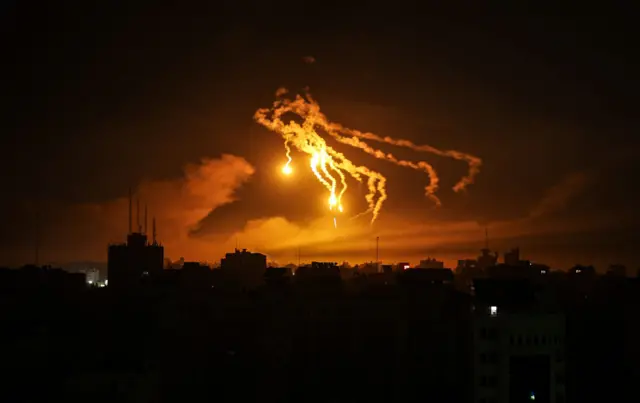 Image source, Getty Images
Image source, Getty ImagesBright orange lights up over the northwest of Gaza as Israeli forces continue to bombard the territory
It's just after 01:20 in Gaza.
The buildings remain dark with electricity scarce in the region, but the night sky continues to be lit up by Israeli air strikes and flares.
These images were taken earlier this evening.
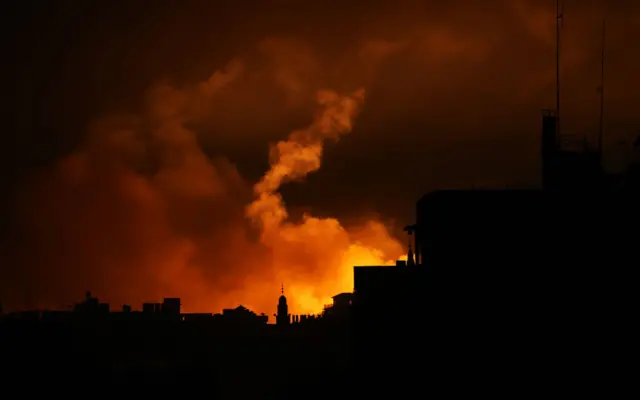 Image source, Getty Images
Image source, Getty ImagesA lighting flare, fired by Israel forces in the sky, over the northwest of Gaza
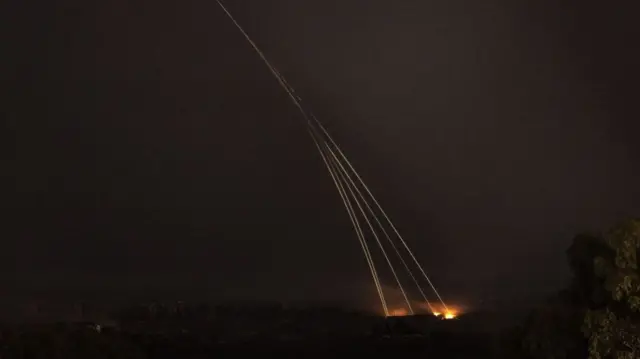 Image source, Getty Images
Image source, Getty ImagesIsraeli airstrikes on the northwest of Gaza, as seen from Sderot city
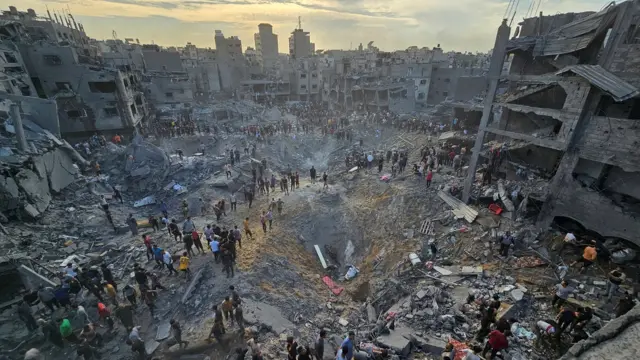 Image source, Reuters
Image source, ReutersPalestinians search for casualties at the site of Israeli strike in Jabalia refugee camp
If you're just joining us, here’s a recap of some of the main developments from the past 24 hours:
Israeli strike at Jabalia refugee camp
Elsewhere
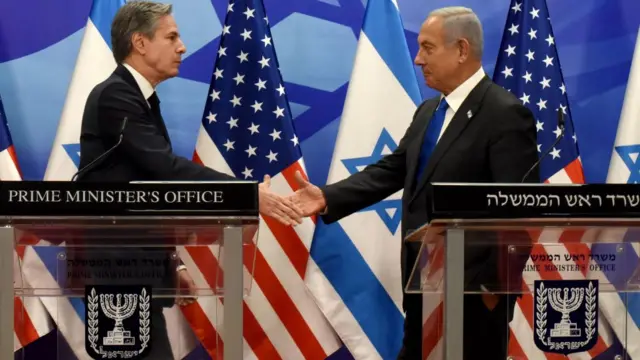 Image source, EPA
Image source, EPAAntony Blinken and Benjamin Netanyahu
US Secretary of State Antony Blinken will visit Israel on Friday, the US State Department says.
He will be meeting members of the Israeli government and will also make other stops in the region.
It is unclear if Blinken will meet with any Palestinian officials on the trip.
This will be Blinken's second trip to the Middle East in the past three weeks.
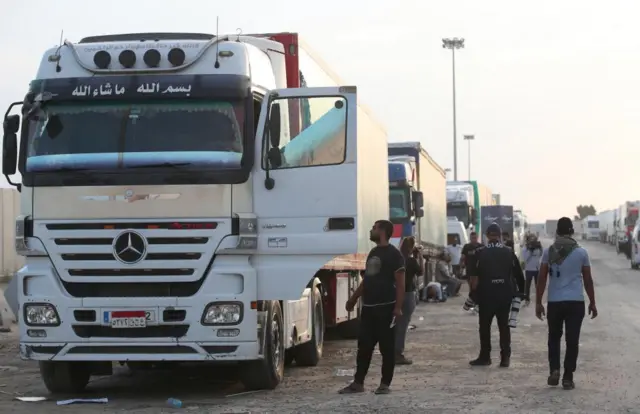 Image source, EPA
Image source, EPASixty-six aid trucks have entered the Gaza Strip in the last 24 hours, according to the US.
Food, water and medicine was allowed through, and spokesman John Kirby said the United States was continuing to call for fuel deliveries to re start.
Authorities in Egypt say 81 severely injured Palestinians in Gaza will be taken to Egyptian hospitals for treatment.
Bolivia says it has cut diplomatic ties with Israel over its military operation in Gaza.
The deputy foreign minister, Freddy Mamani condemned Israel's actions as "aggressive and disproportionate".
Bolivia is the first Latin American country to sever relations with Israel over the conflict. It has called for a ceasefire and says it will send aid to Gaza. The country only restored ties with Israel in 2019, a decade after they were cut over previous attacks on the Gaza Strip.
There's some reaction now to the Israeli military confirming that it carried out a strike in Jabalia, which it says killed a senior Hamas commander.
The Hamas-run health ministry and a hospital director say at least 50 people were killed.
Qatar condemned the strike and said these kinds of attacks on Gaza would "undermine mediation and de-escalation efforts".
Since the conflict between Hamas and Israel erupted on 7 October, Qatar has been thrust into the diplomatic spotlight with the role it's been playing in talks to secure the release of hostages taken by Hamas. You can read more on that here.
 Jeremy Bowen
Jeremy Bowen
International editor, in Jerusalem
I’ve just spoken to Dr Mohamed El Ron - the surgical director at the Indonesia Hospital in Jabalia, where many of the casualties from the air strikes were taken.
El Ron said the hospital received around 400 casualties, including 120 dead, and the majority were children and women. He sent photos and videos from the emergency department showing dozens of casualties being treated.
He also told me there were severely wounded people who needed complex surgery who had to be transferred "under fire" to Al Shifa hospital in Gaza City.
El Ron said the attack this afternoon followed an earlier one this morning, from which the hospital received 50 to 60 injured and around 10 dead.
Israel has said the destruction came from air strikes that killed a senior Hamas commander and some of his men. It added that Hamas was using these civilians as human shields in a cruel and brutal manner - and that the airstrikes caused the collapse of underground Hamas bunkers.
Israel sees a moral distinction between unintentional casualties in a just war and deliberate murder by Hamas. The Americans told Israel not to be blinded by rage and to respect the laws of war, which protect civilians. Palestinians believe Israel is determined to inflict another catastrophe on them.
Tamara Al-Rifai is from the UN agency for Palestinians, UNRWA and tells the BBC that Jabalia is a very poor camp "with most of its population relying on aid".
Initially, Jabalia was a camp with tents, like old black and white photos show, but as with most camps set up in 1948, they have slowly turned into places more akin to shanty towns,
Al-Rifai says the UNRWA knows the camp very well as it is the largest of eight camps for Palestinian refugees on the Gaza strip and also the most densely populated.
The UN agency has 16 schools in the camp, Al-Rifai says, "so I dare say that my colleagues in these schools - the teachers, the educators - know most of the kids in these camps so it is a very difficult reckoning moment for us while our teams can't get there yet".
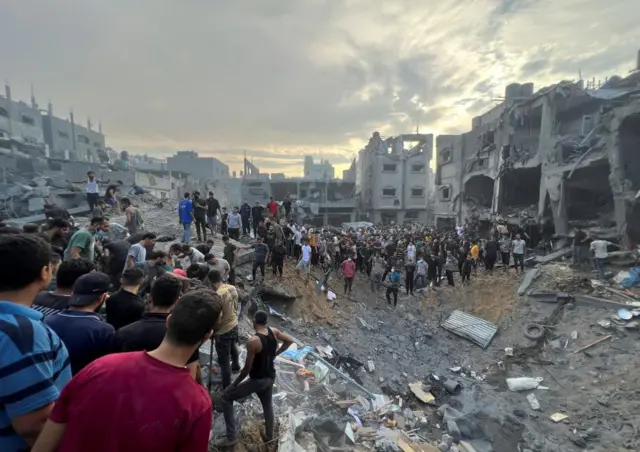 Image source, Reuters
Image source, ReutersPalestinians search for casualties at the site of Israeli strikes on houses in Jabalia refugee camp in the northern Gaza Strip
The director general of the Palestine Red Crescent Society has told BBC News that 25 civilians were killed in the attack on the Jabalia refugee camp.
Earlier, the Hamas-run health ministry and a hospital director said at least 50 people were killed.
The BBC isn't able to verify either of these figures independently.
Earlier, IDF spokesperson Daniel Hagari said when Israeli fighter jets attacked the Jabalia refugee camp in Gaza, Hamas's widely-discussed underground network was affected.
In the below video, the BBC's security correspondent Gordon Corera analyses videos from inside the network of tunnels - thought to cover around 483 km (300 miles) under Gaza - and explores how they could shape the next phase of the war.
Gaza tunnels: Breaking down videos from Hamas' secret network
Matt Murphy
Live reporter, in Washington DC
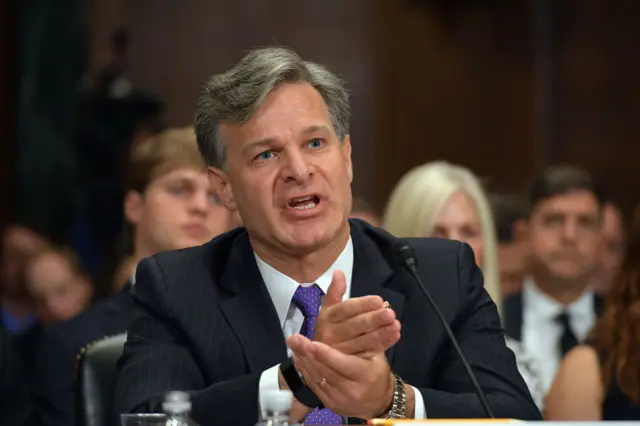 Image source, Getty Images
Image source, Getty ImagesFBI director Christopher Wray has warned that Hamas's 7 October attack on Israel could motivate extremist groups across the world to step up violent campaigns.
Speaking to a congressional committee in Washington DC, Wray told lawmakers that "the actions of Hamas and its allies will serve as an inspiration the likes of which we haven’t seen since ISIS launched its so-called caliphate years ago".
The security chief also warned that antisemitic attacks on Jewish Americans had increased since the conflict erupted - noting that a man was arrested in Texas last week "studying how to build bombs and posted online about his support for killing Jews".
"This is a threat that is in some way reaching historic levels," Wray said. "The Jewish community is targeted by terrorists across the spectrum. Our statistics would indicate for a group that only represents 2.4% of the public, the Jewish community accounts for 60% of religious based hate crimes."
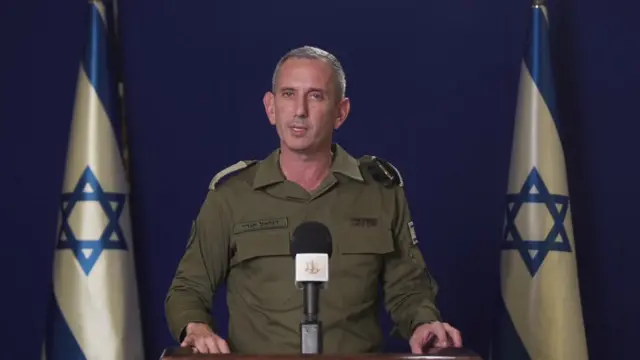
A few moments ago we heard from IDF spokesperson Daniel Hagari who was giving the Israeli military’s daily press briefing. Here’s a summary of what he said:
As a reminder, the BBC is not able to immediately verify most battlefield claims
Hagari says that Hamas continues to use the civilian population as shields intentionally "and in a very cruel and brutal manner".
He then says (current Hamas leader in Gaza) "Sinwar does not care about the people of Gaza", saying he "intentionally built Hamas infrastructure beneath people's homes".
Hagari then reiterates the IDF's call for people in the north of the Gaza Strip to head south. Israel has declared northern Gaza an evacuation zone.
Here's a bit more from Hagari. He says the attack also killed several other Hamas members who were with the commander both "in the building and underground".
He says the targeting of the building led to the collapse of other buildings, which he said had "very extensive infrastructure".
"The purpose of that infrastructure", Hagari says, "was to carry out terrorist activities against our forces".
He says the entire infrastructure collapsed.
The IDF spokesperson Daniel Hagari has confirmed that Israeli fighter jets carried out the attack on the Jabalia refugee camp in Gaza, which he said killed senior Hamas commander Ibrahim Biari and caused the collapse of Hamas's underground infrastructure.
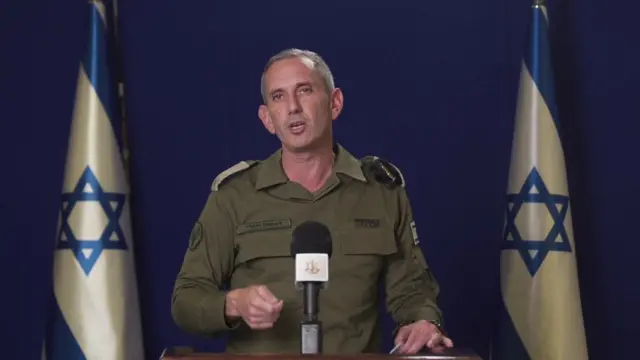
Israel Defense Forces spokesman Danial Hagari is speaking now, stay with us we bring you what he says.
As we've been reporting, a huge explosion at the Jabalia refugee camp in northern Gaza is reported to have killed dozens and injured many more.
Below is a map showing where the blast happened, as well as the camp's location.
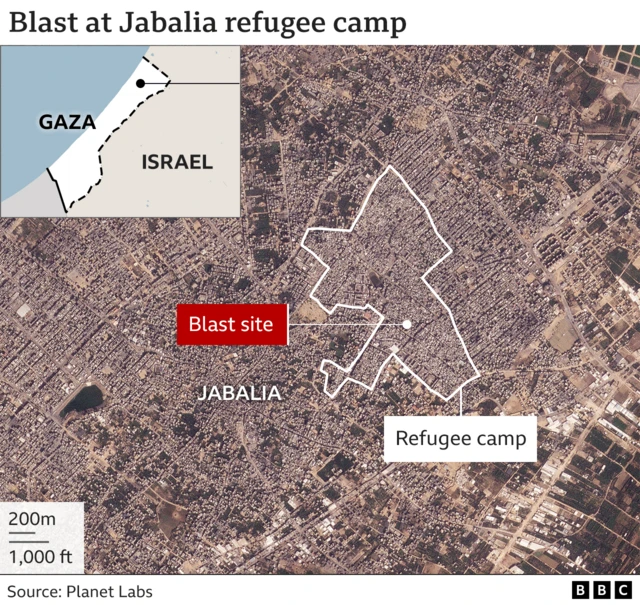 Image source, .
Image source, .The World Health Organization says it is extremely concerned by reports of air strikes in the vicinity of the Turkish-Palestinian Friendship Hospital in the last two days.
The hospital, which is located south of Gaza City, is the main cancer centre in the Gaza Strip.
The Israeli military told the BBC that it had not stuck the Turkish-Palestinian Friendship Hospital. It did not deny that there may have been strikes in the area.
"Services have been severely reduced because of cut-off electricity and restricted entry of medicines, other medical supplies, fuel and water. It is currently sheltering internally displaced people," the WHO wrote in a post on X on Tuesday, external.
WHO Director General Tedros Adhanom Ghebreyesus said: "Cancer patients are already fragile, and it's imperative to do everything possible to ensure they're receiving the care they need. It’s truly a matter of life or death."
The BBC has verified a video circulated on social media on Monday evening in which a cloud of smoke can be seen outside the hospital and an explosion can be heard.
The Hamas-run health ministry in Gaza circulated on Tuesday photographs that it said showed some damage to the interior of the hospital.
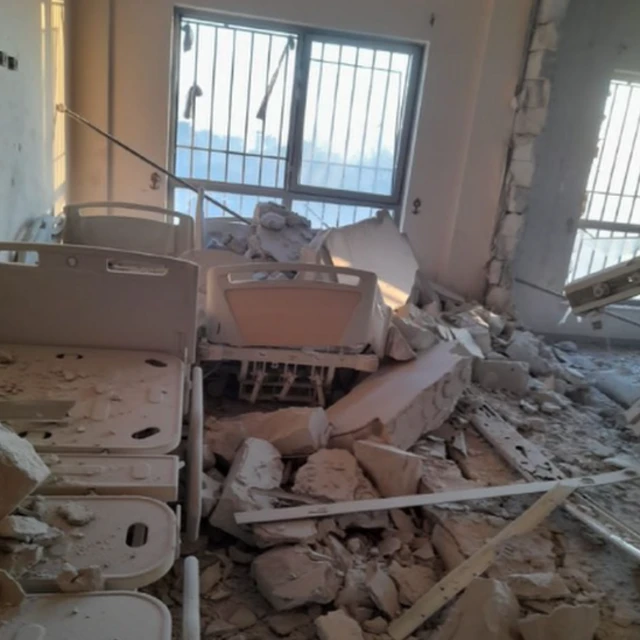 Image source, Gaza health ministry
Image source, Gaza health ministryThe Hamas-run Gaza health ministry published photographs which it said shows damage inside the hospital